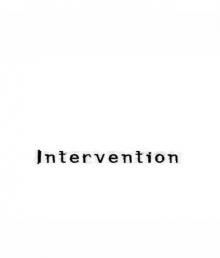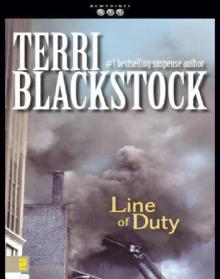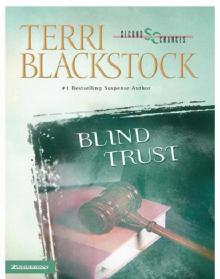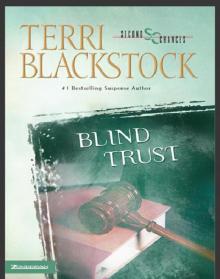- Home
- Terri Blackstock
Evidence of Mercy Page 6
Evidence of Mercy Read online
Page 6
He thought of the one relative he still had, the one he’d woven stories about to make his past sound charmed, the one he had pretended was dead. “No,” he said finally. “The last thing I need is people crying over me, waiting like vultures to see if the new me will have any resemblance to the old one.”
“It wouldn’t be like that, Jake,” the nurse said. “You need the support of people who love you.”
“I’ve never needed it before,” he whispered as he closed his eye to dismiss them. “And I’m not about to start needing it now.”
If you’d wanted a vacation, Lynda, all you had to do was say so.” Sally Crawford pulled a chair up to Lynda’s bed and set the bag she’d brought on the table in front of her. “I could use one, too, but you don’t see me crashing a plane to get one.”
Lynda was tired—her sleep last night had been restless and plagued with nightmares—but she managed to smile at her secretary. “Looks like I’m gonna get a longer vacation than I need. That blasted doctor said I have to stay out at least a month. Honestly, I feel like I’ll be as good as new in a few days, but—”
“Lynda, you have injuries you can’t even see. You have to let yourself recover. Besides, I’ll be in the office taking care of the day-to-day stuff.”
“But I have cases pending. Court dates. . . .”
“Some of them can be postponed, and the ones that can’t are going to be divided among the partners and associates. We went over all of them this morning. Your cases are in good hands.”
Lynda sank back onto her pillow. “Well, I guess that’s something.”
“There’s just one thing.”
Lynda looked up. “What?”
“The Paige Varner case. No one wanted it.”
“No one?” she asked.
“There’s no money in it,” Sally reminded her. “And it’s a real shame because she came in yesterday all upset because her husband had shown up at her daughter’s day care and tried to take her.”
Lynda closed her eyes. “It’s my fault. I’ve been putting her off.”
“You’ve been busy. When you reach for a handout, you have to wait your turn.”
That had, indeed, been her philosophy, Lynda admitted, but hearing it now, she didn’t like the way it sounded. “She can’t help not having any money. And that man. The restraining order obviously hasn’t scared him at all. I was afraid it wouldn’t. He’s fearless. He’d have to be—he’s suing her for custody, claiming she’s the one who’s abusive.”
“She’s anxious to get the case resolved so she can leave the state.”
“I know. The judge has ordered her to stay in town until after court. Do you have her file with you?” Sally reached for her briefcase and pulled it out, and Lynda took it. “So nobody wanted her, huh?”
“I’ll just tell her she’ll have to find another attorney.”
“No, she’s tried.” She studied the file for a moment, then glanced at Sally again. “Sally, am I really that mercenary?”
“How mercenary?” Sally asked, not following.
“So mercenary that I would push this case to the bottom of my priority list just because the hours I spent on it weren’t billable?”
“Lynda, you did what anybody would do.”
Lynda sighed and closed the file. “I’m keeping this case,” she said. “I’ll handle it.”
“But Lynda!”
“It’ll be all right,” she said. “Just call Paige and tell her to come by to see me here.”
Sally held back her protest, but her disapproval was apparent. “All right, Lynda. If you say so. I’m gonna go now. You look like you need some rest. A lot of it.”
Lynda dropped the file onto the table next to her. “You think I look bad. You should see the other guy.” But the words weren’t said in humor, and that haunted look passed over her eyes again. “At least he’s alive. I’ve been calling ICU every hour. As far as I know, he’s still not awake, though.”
“They’re saying he may never walk again.”
Lynda snapped a look back to Sally. Slowly, she sat up. “What? Where did you hear that?”
“On the news,” Sally said. “Last night they did a report about the crash. Apparently he has a spinal cord injury, and he lost one eye.”
Lynda brought her hands up to cover her face and sank back into her pillow. “Abby said his face was the least of his problems, but I didn’t know. . . .”
“All things considered, Lynda, he’s lucky to be alive.”
Lynda tried to take in a deep, cleansing breath and slid her hands down her face. “Yeah,” she whispered. “I guess we have to look at it that way. I just don’t understand.”
“Understand what?”
“Why I wasn’t hurt worse. My legs are fine. I only broke a couple of ribs and lost my spleen. He almost died, and it wasn’t even his plane!”
“Lynda, stop beating yourself up. If you’d been hurt worse, do you think it would have taken away from his injuries?”
Sally didn’t understand, Lynda thought dismally. Nobody could understand.
Sally seemed at a loss for anything else that would comfort her, so she opened Lynda’s bag. “Well, anyway, I got you everything you wanted from home. If you need me to go back, I’ll be happy to.”
“No,” she said, without even checking the bag’s contents, “this should be enough. Thanks, Sally.”
Sally slapped her thighs. “No problem. I’ll get in touch with Paige as soon as I can. And you call if you need me. Everything will be back to normal in no time, okay?”
“Yeah,” Lynda whispered, but as she watched Sally leave the room, she wasn’t sure that normal would ever be good enough again.
Jake wished he’d stayed asleep.
And frankly, he didn’t know why he hadn’t. What was the use in waking up, just so he could listen to the doctor tell him again of the gash that had maimed his face and destroyed one eye? And that was just the beginning.
“Tell me about my back and my legs, Doctor. Tell me why I can’t move.”
Dr. Randall—a man in his mid-fifties who had more lines on his face than a street map of Tampa—leaned wearily over Jake’s bed rail and seemed to consider his words carefully. This was going to be a tough one, Jake thought. When a doctor grew that thoughtful and hesitant about giving a prognosis, the most obvious question was, “How soon should I buy my burial plot?” But Jake feared the news might even be worse than death.
“You have lower lumbar compression, Jake, due to the impact of the crash, and that’s led to a condition called spinal shock,” the doctor said carefully. “It’s caused paralysis in your legs. You can count yourself fortunate, though. If the compression had been higher, you wouldn’t have use of your arms, either.”
“So I’m supposed to breathe a sigh of relief because I’m a paraplegic and not a quadriplegic?”
The doctor accepted his cynicism with patience. “Let me finish, Jake. The paralysis could be temporary. You have a gash on your back, too, and a lot of swollen tissue. The steroids we’re giving you are to keep the swelling down so it won’t cause any more nerve damage. And until we get that swelling down, there’s no way to tell how much of the damage is permanent.”
Jake fought the furious tears burning his eyes. “Bottom line, Doc. Am I ever gonna walk again or not?”
Dr. Randall rubbed his eyes, leaving them red. “We can’t know that for several days. Maybe longer.”
“But what do you think?”
The truth seemed to take more out of the doctor than he had to give. “I don’t know, Jake. We’ve been successful with a drug that we think regenerates the nerve cells, and we’ve started you on it today, in your IV. It all depends on the extent of the nerve damage. We just have to be patient and hope for the best. Meanwhile, you’ll start working with the physical therapist and occupational therapist this morning to keep your joints and muscles working.”
“I can’t move,” Jake scoffed. “How can I work my muscles or joints?”
&
nbsp; “They’ll do it for you. But Jake. . . .” He touched Jake’s arm, forcing him to look up at him. “As hard as your therapy is going to be, you have to cooperate. Those therapists are going to get you functioning as well as possible, but you have to work really hard. Harder than you’ve ever worked before.”
“I don’t want to work at being a functional invalid,” Jake countered. “I’d rather just give it all up.”
“Well, that’s not one of your choices,” Dr. Randall said, still kindly. “You flat-lined in the ambulance, but the paramedics brought you back. And later, when the worst part of this is behind you, you’re going to be glad they did.”
“They should have let me die,” he said through dry, cracked lips. “I don’t want to be here. I don’t want to do this.”
“No one ever does, Jake,” the doctor told him. “But you’re going to.”
“What about her?” he asked. “The plane’s owner. Did she make it?”
“Yes, she survived,” Randall assured him.
“Is she paralyzed, too?”
The doctor seemed to know where this was going. “No. She broke some ribs, damaged her spleen, but she was lucky.”
Jake’s face reddened. “Terrific,” he bit out. “And I’m lying flat on my back.” Gritting his teeth, he slammed his fist on the bed. “It wasn’t even my plane!”
“There’ll be anger, Jake,” the doctor said. “But you’ll get through it. You’ll need support. Call all of your family and friends to rally around you. Don’t underestimate how much they can help.”
Jake didn’t respond, for the tears were blurring the one eye he had left, constricting his throat, making him so angry he could have killed someone if he’d just had a weapon.
Family, he scoffed bitterly. Friends.
Didn’t the doctor realize that he didn’t want anyone to see him like this?
Dr. Randall left him then with the monitors and machines humming in his room, with the IV dripping through a tube in his arm, with the nasogastric tube in his nose draining the bile that kept rising.
Who would have believed it when he’d gotten up yesterday morning, all enthusiasm and hope?
He wished he’d never decided to buy a plane of his own; he wished he’d never picked up the aviation magazine that had advertised the Piper in its classified ads; he wished he’d never met Lynda Barrett.
It seemed like a year ago that he came bouncing down the steps of the Biltmore, introducing himself to the blonde—now he couldn’t even remember her room number—and riding off in his Porsche. He wondered whether anyone had contacted the manager of the Biltmore to get his stuff or called the moving company about storing his furniture. Was anyone watching his car?
But who? It wasn’t as if he had anyone here he could call. He was new in town and completely alone. Flat on his back or not, he was on his own.
The thought sent rage spiraling up inside him, anger that he didn’t know how to direct. Why had this happened to him? Why not her? She was the one who’d taken him up in a busted plane.
As if in answer to his thoughts, the nurse who’d been hovering over him all morning came to his door. “Jake, is it all right if Lynda Barrett visits you for just a minute? If you’re not up to it, I’ll send her away.”
Jake looked at the door with his remaining good eye, welcoming the opportunity to feed his anger. “Yeah,” he said bitterly. “Send her in. She might as well get a good look.”
The nurse hesitated a moment, then disappeared. In a few moments, she was back, wheeling Lynda in a wheelchair. He gave her a once-over—she was stitched and bruised, too, but both eyes were intact, and her legs, crossed at the ankles, looked as healthy as his had looked yesterday.
“Hi, Jake,” she whispered almost timidly. “How do you feel?”
He looked at the ceiling. “How do you think I feel?”
She took that gracefully. “Probably pretty bad.” She watched as the nurse stepped out of the room to give them some privacy, then wheeled herself closer to the bed. “Jake, I’m so sorry.”
“Not as sorry as I am.”
She swept her eyes down his body, and they lingered on his legs. “We didn’t know if you’d make it. I prayed all night that you would.”
“What for? So I could lie here like a vegetable for the rest of my life?”
“I know how you must feel—”
“Do you?” he asked with exaggerated surprise. “Do you really? Tell me how you know how I feel, Lynda. Have you ever been paralyzed? Have you ever had the sight cut out of your eye? Have you had your face maimed beyond recognition? How do you know how I feel?”
She only gaped at him for a moment, and her fragile expression crumbled. “Okay, I don’t know. But you survived, Jake. Just like I did. We both could have died in that crash, but we didn’t.”
He turned his head to look at her now. “Are you kidding me? I’m supposed to be happy that I’m useless as a human being instead of dead?” Disgusted, he looked at the ceiling again. “Why did you come in here anyway? What do you want?”
For a moment, she couldn’t speak. “Just . . . I just wanted to see if you were all right.”
“Well, I’m not. Satisfied?”
It was clear that she hadn’t expected this reaction from him, and he wondered if she’d expected them to bond from the trauma. Were they supposed to be best friends now and compare notes on what they remembered of the crash and eat lunch together and play cards? Didn’t she realize that the very sight of her made him lament the day he’d laid eyes on her?
She covered her mouth and started to cry. “I guess I shouldn’t have come. I’ll go now.”
“Yeah,” he said. “You need to nurse those poor cracked ribs. I’d call the nurse, but I can’t move.”
At that, Lynda sprang to her feet. He watched her reach unsteadily for the rail, and with a look of furious determination made softer by the tears on her face, she grabbed the remote control with the nurse’s call button from his bed table and thrust it into his hand. “That’s one less thing you can feel sorry for yourself about,” she said. Then, grabbing the handles of her chair, she walked carefully out of the room, pushing it in front of her.
Jake watched her go, his bitter anger at her for surviving intact fading as his indignation at her attitude grew.
Abby, the nurse who had found Lynda in Jake’s room the night before, came upon her again, sitting in her wheelchair in the hall of ICU, weeping bitterly into her hands. Stooping in front of her, Abby tried to raise her face.
“Are you all right, child?”
Sucking back her sobs, Lynda looked up at her. “Jake just said some things—”
“He’s hurtin’, darlin’. Don’t put any stock in what he says. When people hurt, they say all sorts of things.”
But her assurance didn’t help. This was bigger than words. “You want me to push you back to your room, honey?”
Lynda couldn’t answer. “I went there to comfort him, and he just made me so mad—” She broke off and covered her face again. “I told him he felt sorry for himself. How could I say that?”
“You’re human,” Abby said. “Girl, I’ve been spit on, slapped, kicked, cursed, screamed at, puked on—and as much as I pride myself on keeping my cool, I have been known to say some nasty things, just because I’m human. You aren’t even getting paid for listening to it. You can’t expect to grit your teeth and smile through it. That takes something bigger than either one of us.”
Reaching into her pocket, she pulled out a tissue, and Lynda wiped her eyes.
“You know where I go when I can’t take much more, and I feel that old dark side of Abby taking over?”
“Where?”
“The chapel. It’s on this floor. I’ll take you there if you want me to, child. Maybe you’ll find some peace there.”
Lynda nodded. “Yes, that’s where I need to go.”
“Fine.” Abby got to her feet and pushed her out of the ICU doors. “When I get off tonight, how ‘bout I come by your
room and wash your hair? I’ll bet you’re a pretty brunette when you don’t look like you’ve lost a fight with a grizzly.”
Lynda managed to smile under the tissue. “That would be great. I have trouble lifting my arms.”
They reached the double doors to the small chapel, and Abby pushed her inside. The room was dimly lit with candles at the corners of the altar, and it was only big enough for three small pews on either side of the wide aisle.
Abby rolled her to the front and then in a more reverent voice, said, “There’s a phone here at the back, honey. You call me when you’re ready—extension 214—and I’ll have someone come get you.”
“Thank you,” Lynda whispered.
Abby smiled, then closed the doors on her way out.
Lynda sat still for a moment, staring at the cross behind the small lectern and then behind that, at the stained glass window. A white dove was etched into the glass, flying down to the shoulder of a silhouette kneeling in a pool of water.
This is my son, in whom I am well pleased. God’s words echoed through her mind, their very praise an indictment of her own actions.
Tears stung her eyes, and she sat before the altar, wishing to be judged, ready to be condemned. “I don’t know what to say to him,” she confessed aloud. “I don’t even know what to say to you.”
It had been too long since she’d had a serious heart-to-heart with God, too long since she’d sat in his presence. Now she felt her inadequacy like a verdict.
Awkwardly, she tried to thank him for her survival, but Jake’s injuries limited her gratitude. And then she thought of the plane she had loved so much, destroyed in a matter of minutes, leaving her to face the solitude of her life without it.
As her own thoughts condemned her, she looked up to the window again.
. . . in whom I am well pleased . . .
It was from the New Testament, she thought quickly, but she couldn’t remember where. It had been too long since she’d read her Bible, and now she wasn’t even sure where she’d put it.
But she didn’t have to recall the reference to know what it meant to her.
God wasn’t pleased with her. How could he be when she’d made a god of an airplane, an altar of her job, and an idol of her own ego? How could he smile on her when she’d spoken to a sick man the way she had today or when she’d ignored the needs of a poor battered wife who depended on her?

 Aftermath
Aftermath Shadow of Doubt
Shadow of Doubt Second Chance - 05 - Never Again Good-Bye
Second Chance - 05 - Never Again Good-Bye Miracles
Miracles Broken Wings
Broken Wings the Cape Refuge (Cape Refuge Series Book 1)
the Cape Refuge (Cape Refuge Series Book 1) Shadow in Serenity
Shadow in Serenity Distortion (Moonlighters Series)
Distortion (Moonlighters Series) Second Chance - 02 - When Dreams Cross
Second Chance - 02 - When Dreams Cross True Light
True Light Private Justice
Private Justice Last Light
Last Light Downfall (An Intervention Novel)
Downfall (An Intervention Novel) Distortion: Moonlighters Series: Book Two
Distortion: Moonlighters Series: Book Two Evidence of Mercy
Evidence of Mercy If I Run
If I Run Southern Storm
Southern Storm Ulterior Motives
Ulterior Motives Emerald Windows
Emerald Windows River's Edge
River's Edge Intervention
Intervention The Heart Reader
The Heart Reader Line of Duty
Line of Duty Twisted Innocence
Twisted Innocence When Dreams Cross
When Dreams Cross Downfall
Downfall Cape Refuge
Cape Refuge Breaker's Reef
Breaker's Reef Night Light
Night Light Double Minds
Double Minds Justifiable Means
Justifiable Means Covenant Child
Covenant Child If I Live
If I Live If I'm Found
If I'm Found Vicious Cycle
Vicious Cycle Presumption of Guilt
Presumption of Guilt Trial by Fire
Trial by Fire Word of Honor
Word of Honor Second Chance - 03 - Blind Trust
Second Chance - 03 - Blind Trust Blind Trust
Blind Trust Twisted Innocence (Moonlighters Series Book 3)
Twisted Innocence (Moonlighters Series Book 3) Predator
Predator Dawn's Light
Dawn's Light Chance of Loving You
Chance of Loving You Truth-Stained Lies
Truth-Stained Lies Never Again Good-Bye
Never Again Good-Bye Catching Christmas
Catching Christmas